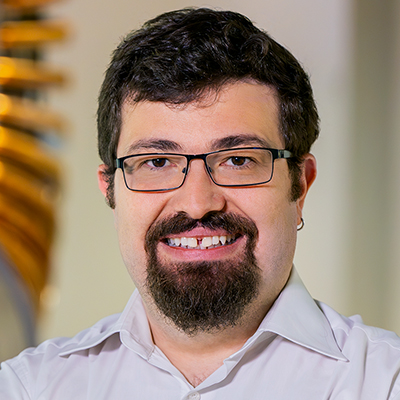Jesse Jenkins and Egemen Kolemen earn promotions
Effective July 1, energy systems expert Jesse Jenkins has been promoted to associate professor with tenure, and fusion energy scholar Egemen Kolemen has been promoted to full professor.
Jesse Jenkins

Jesse Jenkins, promoted to associate professor of mechanical and aerospace engineering and the Andlinger Center for Energy and the Environment, employs optimization-based methods to inform and evaluate the clean energy transition.
At Princeton, Jenkins leads the ZERO Lab, which uses macro-energy systems models to assess low-carbon energy technologies, guide energy innovation, and provide decision-making support to accelerate the energy transition.
Jenkins’ lab has analyzed the costs and potential adoption of emerging clean technologies including enhanced geothermal systems (EGS) and nuclear fusion. His group has also analyzed the energy system impacts of federal policy, such as the EPA’s recent power plant regulations and the Inflation Reduction Act’s hydrogen production tax credit.
Additionally, Jenkins leads the REPEAT Project, which provides regular, timely, and independent environmental and economic evaluations of federal energy and climate policies as they are proposed and enacted. Recent analyses from the REPEAT Project have highlighted the potential impacts of energy policy rollbacks, such as the repeal of a tax credit for electric vehicles.
Jenkins was also a leader of the highly influential Net-Zero America project, and he has delivered invited testimony to multiple Congressional committees. His work is routinely featured in media outlets including the Wall Street Journal, New York Times, and Washington Post.
Jenkins joined the Princeton faculty in 2019. He holds a Ph.D. in engineering systems and an S.M. in technology and policy from the Massachusetts Institute of Technology, as well as a B.S. in computer and information science and philosophy from the University of Oregon.
Previously, Jenkins was named to the TIME100 Next and TIME100 Climate lists for his work to evaluate and shape the clean energy transition in the United States. At Princeton, he has been recognized with the Howard B. Wentz, Jr. Junior Faculty Award and the Princeton Engineering Research Council Award for Excellence in Teaching. He has received multiple commendations from Princeton’s School of Engineering and Applied Sciences for outstanding teaching.
Egemen Kolemen

Egemen Kolemen, promoted to professor of mechanical and aerospace engineering and the Andlinger Center for Energy and the Environment, combines engineering and physics approaches to bring fusion energy from research to reality. He also holds an appointment as a staff research physicist at the Princeton Plasma Physics Laboratory (PPPL).
Kolemen’s group is pioneering new plasma control and optimization approaches for stable, high-performance fusion reactions. His lab has leveraged deep reinforcement learning to predict and avoid plasma instabilities in real time during fusion reactions. They have also deployed machine learning tools to maintain high-performing plasma without edge instabilities, which are bursts of energy at the plasma’s edge that can damage reactor walls over time.
In another line of research, Kolemen’s team has developed open-source software (DESC) for designing and optimizing stellarators, which are fusion reactors that use external coils and magnets to confine plasma during reactions. The software, which is more accurate and less computationally intensive than existing alternatives, is already in use at several companies seeking to develop commercial fusion reactors.
Kolemen’s group is also exploring the use of liquid metals in plasma-facing components of fusion reactors, which could serve as a self-healing metal blanket to minimize reactor damage over time.
Kolemen joined the Princeton faculty in 2014. He holds a Ph.D. in mechanical engineering and aerospace engineering from Princeton and a B.S. in mechanical engineering from Boğaziçi University in Istanbul.
Kolemen’s previous honors include a Technical Accomplishment Award from the American Nuclear Society for his research on using machine learning for controlling fusion reactors, as well as the David J. Rose Excellence in Fusion Engineering Award from the Fusion Power Associates for his explorations of liquid metals for fusion reactions. Kolemen is also an ITER Science Fellow.